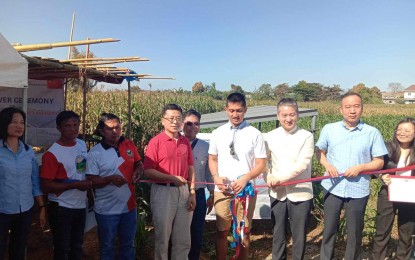
SOLAR-POWERED IRRIGATION SYSTEM. Ilocos Norte Governor Matthew Joseph Manotoc (6th from left) and officials from the Chinese Consulate Center of Laoag grace the turn-over ceremony for the two units of solar-powered irrigation systems in Barangay Pila, Laoag City on Friday (Feb. 16, 2024). The China International Cultural Exchange Foundation donated the irrigation system to select Ilocos Norte farmers' organizations. (Photo courtesy of Irene Ringor)
LAOAG CITY – Some farmers in the rural villages of Pila in Laoag City and Sulbec in Pasuquin town no longer worry about paying expensive diesel to water their crops after receiving two solar-powered irrigation systems on Friday.
Crisner Lagazo, a farmer from Sulbec, in an interview Friday, said he and his fellow farmers from the 4-H Club Association-Pasuquin Chapter are lucky to have been chosen as recipients of the solar project donated by the China International Cultural Exchange Foundation.
“We are so lucky to have a solar irrigation system. This helps us save from the rising cost of fuel to power up our water pumps during the dry season,” he said, citing that the donation is “an answered prayer.”
The Provincial Agriculture Office and the Chinese Consulate of Laoag helped in facilitating the requests of farmers and endorsed them to become the project recipients.
Governor Matthew Joseph Manotoc, in his speech during the turn-over ceremony at the Pila project site, expressed gratitude to the Chinese government for the grants.
“This will go a long way to aid our farmers. Irrigation is always a challenge as our land is very arid,” he said, citing also the provision of irrigation projects as well as marketing, warehousing, and processing as necessary aids to boost farmers’ productivity.
“We need to upgrade and become at par with other farmers in other countries because efficiency is quite low despite being one of the top producers of various agricultural products,” he added.
According to agriculture experts, each solar irrigation system unit can generate 18 to 22 cubic meters of water per hour, or five to seven liters per second, with a serviceable area of around five hectares.
This translate to savings of around PHP6,000 worth of fuel when irrigating crops due for harvest in four months.
In Laoag, the city government has already installed several solar irrigation systems to help farmers produce off-season fruits and vegetables during the dry season. (PNA)
